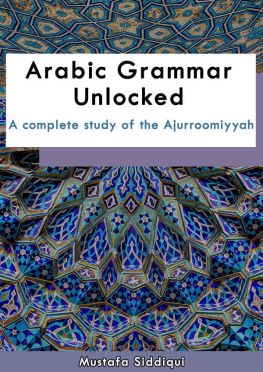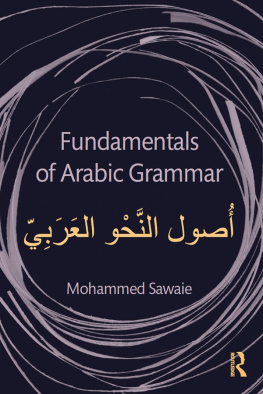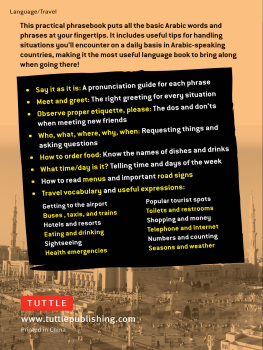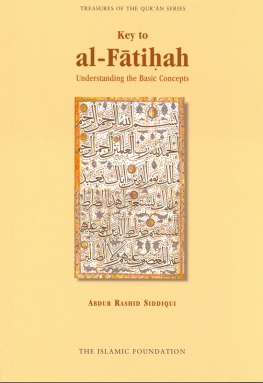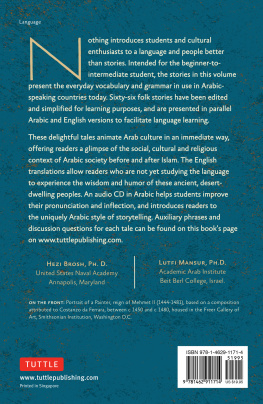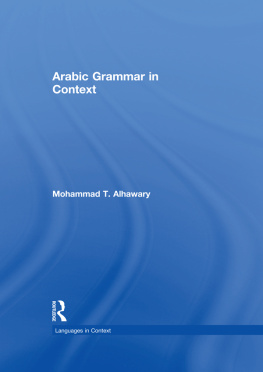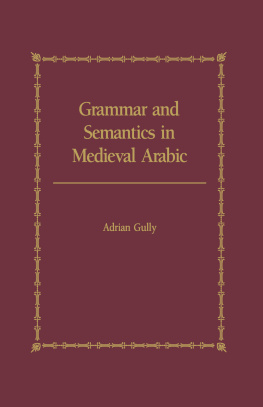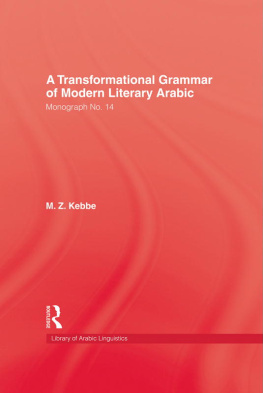Siddiqui - Arabic Grammar Unlocked: A complete study of the Ajurroomiyyah
Here you can read online Siddiqui - Arabic Grammar Unlocked: A complete study of the Ajurroomiyyah full text of the book (entire story) in english for free. Download pdf and epub, get meaning, cover and reviews about this ebook. year: 2019, genre: Home and family. Description of the work, (preface) as well as reviews are available. Best literature library LitArk.com created for fans of good reading and offers a wide selection of genres:
Romance novel
Science fiction
Adventure
Detective
Science
History
Home and family
Prose
Art
Politics
Computer
Non-fiction
Religion
Business
Children
Humor
Choose a favorite category and find really read worthwhile books. Enjoy immersion in the world of imagination, feel the emotions of the characters or learn something new for yourself, make an fascinating discovery.
- Book:Arabic Grammar Unlocked: A complete study of the Ajurroomiyyah
- Author:
- Genre:
- Year:2019
- Rating:4 / 5
- Favourites:Add to favourites
- Your mark:
- 80
- 1
- 2
- 3
- 4
- 5
Arabic Grammar Unlocked: A complete study of the Ajurroomiyyah: summary, description and annotation
We offer to read an annotation, description, summary or preface (depends on what the author of the book "Arabic Grammar Unlocked: A complete study of the Ajurroomiyyah" wrote himself). If you haven't found the necessary information about the book — write in the comments, we will try to find it.
Siddiqui: author's other books
Who wrote Arabic Grammar Unlocked: A complete study of the Ajurroomiyyah? Find out the surname, the name of the author of the book and a list of all author's works by series.
Arabic Grammar Unlocked: A complete study of the Ajurroomiyyah — read online for free the complete book (whole text) full work
Below is the text of the book, divided by pages. System saving the place of the last page read, allows you to conveniently read the book "Arabic Grammar Unlocked: A complete study of the Ajurroomiyyah" online for free, without having to search again every time where you left off. Put a bookmark, and you can go to the page where you finished reading at any time.
Font size:
Interval:
Bookmark:
Arabic Grammar Unlocked
FIRST EDITION
A complete study of the Ajurroomiyyah
By Mustafa Siddiqui
Creator of UltimateArabic.com
Copyright 2019 Mustafa Siddiqui
ALL RIGHTS RESERVED
All praise belongs to Allah, Lord of the Worlds, and prayers and peace upon His noble messenger.
Dear reader, what youre holding in your hands is the result of a journey spanning several years. The story starts when I was first seriously learning Arabic grammar and was introduced to the classical text on Arabic grammar known as the Ajurroomiyyah , which needs almost no introduction to any serious student. Although I had already learned most of the rules before studying it, studying its commentary with a teacher is what really blew the doors off in my understanding, and I came to the realization that despite the presence of many different teaching methods, there is a reason why texts like the Ajurroomiyyah and Ibn Maliks Alfiyyah have been taught throughout the centuries, and we shouldnt overlook the importance of studying them. With that in mind, I wondered if anyone had produced a detailed explanation of it in English. I came across some straight translations, some (incomplete) explanations and some videos, but nothing as of then in written form.
Beginning in 2016, I started a series of posts explaining the Ajurroomiyyah on UltimateArabic.com , as adapted from al-Tuhfat al-Saniyyah and other commentaries I found useful. One request that consistently came from readers was to have it all in one document for easy reading. After finishing the series in 2017, work began on getting it into print form with many hours of editing, re-thinking and re-formatting. This book is the result of that effort, so I hope that leads you to treasure it and benefit from it.
This book is written in explanation of the Ajurroomiyyah ( ) by the scholar Abu Abdillah Muhammad ibn Abdillah ibn Dawud as-Sanhaaji ( ) , famously known as Ibn Ajurroom ( ) . He lived between the years 672 to 723 after the prophetic migration to Madinah. Since then it has been passed on and explained to generations throughout the centuries.
Much of the content of the book is adapted from al-Tuhfat al-Saniyyah ( ), written by Muhammad Muhyi ad-Deen Abd al-Hameed. In addition to that, I added extra benefits that I thought should be mentioned, as taken from commentaries by Sh. Muhammad bin Saalih al-Uthaymeen and others (may Allah have mercy on them all).
Most, if not all, the questions and exercises were taken from al-Tuhfah , except that I have provided answers and solutions in an appendix that were left unanswered in the original work.
Its up to you how you want to read it, but regardless of your level, take a few moments to go through the table of contents. This will prepare you for the journey ahead and is a habit that will benefit you when facing any book for the first time.
Beginner students can start right from the beginning, but if you have already studied before, the questions at the end of each section will help you know if you need to review the section before moving on. To make it easier for you to absorb the material, Ive deliberately chosen to keep the tone conversational throughout the book.
May Allah use this book to make learning the language of His book and His Prophet easy for you and for you to benefit many others with it. May He have mercy and forgive on those who passed this knowledge on to us, and the final word is all praise belongs to Allah, the Lord of all the worlds.
- Mustafa Siddiqui (April 2019)
We're going to dive into what is considered "speech" in Arabic. To start with, the definition given in (the Ajurroomiyyah) is:
(speech) is beneficial ( ), composite ( ) utterance ( ), upon established rules ( ).
The word ( kalaam ) has two meanings, one in the language, and one used in the science of grammar.
- The linguistic is whatever you get a benefit from because of, whether it is an utterance or not (e.g. writing, drawing or pointing).
- As for the in the sense of grammar:
- It must be an utterance
- It must be composite
- It must be beneficial
- It must be set in the Arab way
"It must be an utterance"
It must be a sound that contains some of the alphabetical letters ( through ). Some examples are (Ahmad), ( yaktubu ) , and (happy). Each of these, when pronounced is a sound that contains four letters from the alphabet. Pointing, for example, is not called kalaam by the grammarians because it doesn't have sound, even if its called speech by the linguistic scholars because of the benefit attained by it.
"It must be composite"
It must be composed of two words or more. For example:
- - Muhammad is a traveler
- - Knowledge benefits
- - The striver attains glory
- - Every striver has a dividend
- - Knowledge is the best that you pursue
Each of these expressions is called speech, and each of them is composed of two or more words, as a single word is not called speech by the grammarians unless something else comes with it. This "something else" can be actual as in the previous examples.
It can also be implied, as when someone says to you ? ( Who is your brother?) and you simply say Muhammad. This single word is then considered "speech" because the implication is (Muhammad is my brother), which is really three words: (Muhammad), followed by (brother), then the pronoun (me).
"It must be beneficial"
It is appropriate for the speaker to pause such that the listener is not waiting for something else. If you were to say (When the teacher comes...), then this is not called speech, even if it was composed of three words because the listener is waiting for what you say after it (i.e. he's thinking "What will happen when the teacher comes?"). If you were to say (When the teacher comes, the students listen), it becomes speech through attaining the full benefit.
"It must be set in the Arab way"
The words that are included in the speech are from the utterances that the Arabs have set for specific meanings. For example, is a word that the Arabs have set for a meaning (the occurrence of " presence " in the past tense). The Arabs have set the word for a meaning, which is the entity of the person who named by this name. If you say (Muhammad came), it includes two words, each of which is from what the Arabs have set down. On the contrary, if you speak with speech from what the non-Arabs have put down, such as Persian, Turkish, Berber or a European language, then it is not considered speech by the scholars of Arabic, even if the people of other languages call it that.
- - The weather is clear
- - The garden bears fruit
- - The crescent is shining
- - The sky is clear
- - The moon lights up at night
- - The one who strives will succeed
- - The lazy person will not be successful
- - There is no deity (worthy of worship) except Allah
- Muhammad is the elite of those sent
- - Allah is our Lord
- Muhammad is our prophet
- Muhammad
- Ibrahim
- - He stood
- - from/of
- - The city of Alexandria (What about it??)
- - The slave of Allah
- Hadramaut
- - If the people were fair/just...
- - When the winter comes... (What will happen when it comes??)
- - No matter how much the hypocrite hides...
- - That the sun rises...
Font size:
Interval:
Bookmark:
Similar books «Arabic Grammar Unlocked: A complete study of the Ajurroomiyyah»
Look at similar books to Arabic Grammar Unlocked: A complete study of the Ajurroomiyyah. We have selected literature similar in name and meaning in the hope of providing readers with more options to find new, interesting, not yet read works.
Discussion, reviews of the book Arabic Grammar Unlocked: A complete study of the Ajurroomiyyah and just readers' own opinions. Leave your comments, write what you think about the work, its meaning or the main characters. Specify what exactly you liked and what you didn't like, and why you think so.

